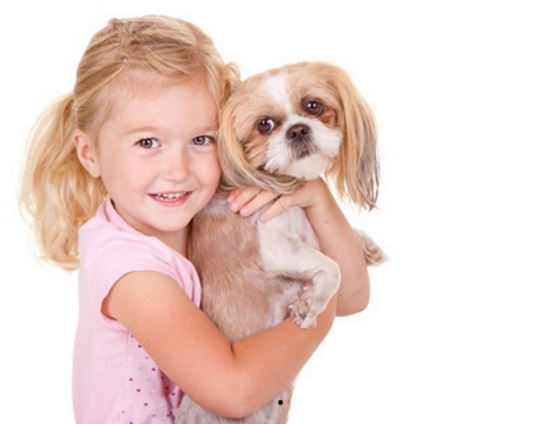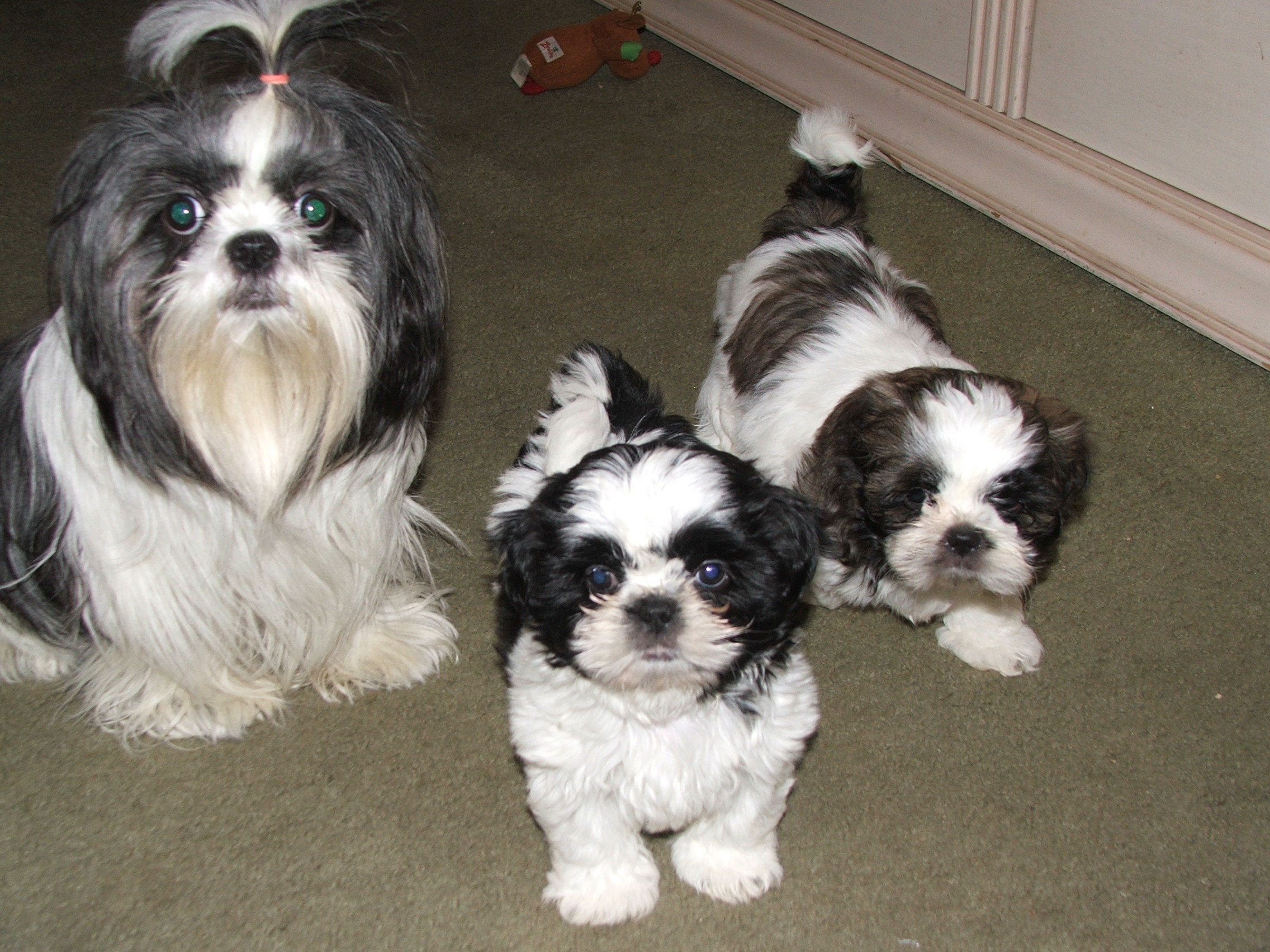- Home
- Shih Tzu Information
- shih tzu and kids
Are Shih Tzu Good with Kids?
Shih Tzu Family Dog
JULY 1, 2019 | WRITTEN BY STACY
Whether you have children and are thinking about getting a Shih Tzu, or vice versa, it makes sense that you would want to know if the two are a good match.
It's a fact that certain dog breeds are great with kids, while others are recommended for kid-free homes, so it would be a mistake to assume that every dog will tolerate children.

But what about Shih Tzu, are they good with kids?
Because of their affectionate
nature and usually docile temperament, Shih Tzu make wonderful family pets. Overall, Shih Tzu are regarded as a good fit for homes with children. It is
important, however, to always make sure young children understand how to
appropriately treat their small companions.
Even though Shih Tzu generally are a good dog for kids, it's still not an open and shut case.
As with anything, there are different things you need to think about before making your decision.
If you’re
considering bringing a Shih Tzu into your household, and you have young
children, you'll definitely want to check out the answers to these important questions
first.
What Kids Should Know When They Meet a Shih Tzu
It's important to start working with your children at a very young age on the proper way to treat all animals.
This is important, even if your family doesn't have any pets at the time.
This will help future contact with
animals go smoothly and safely, for both the animals and for your child.
This little girl is having fun playing with her Shih Tzu dog while it tries to mimic her voice
So,
what are the things that young children need to know when it comes to
interacting with dogs?
- Children need to understand that a Shih Tzu is not a toy
Let your child know from an early age that animals are living creatures
that need to be taken care of. Tell your child that an animal can get
"ouchies," too, and can also feel sick, happy, scared, etc.
- Children need to know how to behave around dogs, and other animals, that they don't know
This tip is especially important if your child is a big animal lover; make sure that she knows never to approach an animal that she does not know without first getting permission from the owner.
Let her know that some dogs might be very protective of their owners and homes, or some dogs might not be used to children.
If the dog is a stray, you should impress upon your child that she should never go near a stray as it might be aggressive or even sick.
Even if the animal is familiar, like a friend or family member’s pet, tell your child she still needs to ask first before petting the animal, and she should always make sure that an adult is nearby.
- Children need to know how to approach a Shih Tzu
Let your child know to move slowly and gently. She should approach from the side and crouch down a bit instead of standing over the dog.
Don't be very loud as this can frighten the dog, and she should offer an open palm or lose fist for the dog to sniff. Often it's best to let a dog come to you.
- Children need to know how to properly pet an animal
Most young children are taught to use two fingers to pet an animal to ensure a gentle touch.
As children get more practice they can pet their animals with their hand. The touch should be nice, gentle strokes on the dogs back.
Don't let your child pat
the dog's head. Dogs actually don't like this, and it can be perceived as
a threatening act.
- Children need to know how to properly pick up a dog (and if they even should)
Most of the time, it's best for young children to leave their furry friends on their own four legs.
As your child gets older, however, she will probably sometimes need to pick up your Shih Tzu, so make sure she knows the proper way.
Keep the dog upright, not baby doll style, and make sure the pup is completely supported and not hanging from your child's arms.
His or her
grasp should be comfortable and not overly restrictive. The dog needs to feel
like it can get away whenever it wants to.
- Children need to understand a dog's warning signs
Teach your child doggy warning signs ahead of time.
Low growls, bared teeth, snaps, walking away, hiding under furniture, tail tucking and cowering are all signs that a dog is either scared, nervous, aggressive or just wants to be left alone.
Also, make sure your
child knows to not approach a dog that is eating or chewing on a bone. A cute
rhyme that they won’t forget is,
"If a dog has a bone, then leave him alone!"
Does It Make Any Difference if the Shih Tzu is a Puppy or an Adult Dog?

The short answer here is, yes, it definitely does. It makes a big difference for both the Shih Tzu and the child.
Just like adult humans act differently than human children (well most of them anyway) adult dogs behave differently than frisky puppies.
A young child may view a small bouncy puppy as a living stuffed animal and try to handle it just like he would his favorite teddy bear.
Also, as sturdy a dog as Shih Tzu are, the puppies are still tiny and vulnerable to injuries from overly excited children.
Puppies are also new and learning how to interact with their new human companions. So they may still be nipping and scratching and unintentionally hurt a child during play.
Therefore, just as you want to teach your children how to act with dogs, you also need to train your puppy on how to act with people.
It's important to make sure the Shin Tzu know that even the little
humans in the house are its alphas and not its littermates.
Older dogs, on the other hand, could perhaps be a little set in their ways by the time young children come along.
If a child tries to play with an older dog the same way he plays with a puppy, the older canine might decide enough is enough and tell the kid to back off.
But if the child knows how to properly care for their animal friend, then a wonderful relationship can form, very often with the
dog looking out for the child.
What Are the Warning Signs That Signal the Relationship Between Shih Tzu and Children Might Not Work Out?
As with any relationship, some things are just not meant to be. Sometimes a child and Shih Tzu just won't be a good match for any number of reasons.
So, if you notice any of these warning signs you may want to think twice before you try to push the combo together:
- The dog always growls with bared teeth at the child, especially if the child is doing nothing to bother the dog.
- Your child is extremely frightened of the animal, or maybe all dogs, even if the dog is across the room.
- The dog has snapped at the child, especially for no apparent reason.
- Your child cannot seem to grasp (or won't listen to) how to treat the dog and continues to hit, kick, grab and pull at it.
Notice that these are things that make the relationship miserable for both child and Shih Tzu.
Even if your dog is extremely tolerant to constant tail pulls and ear grabs that does not make it okay.
Likewise, if your dog is easy going with everyone but always on edge with children, it's a sign that the matchup is probably not a good idea.
Dogs deserve to be safe and happy, too.
Basically, as long as you use common sense and teach both dog and child on how to behave with each other, Shih Tzu will get along well with kids.
In fact, the two can develop an incredible bond and become fast friends for many years to come.
- Home
- Shih Tzu Information
- shih tzu and kids




